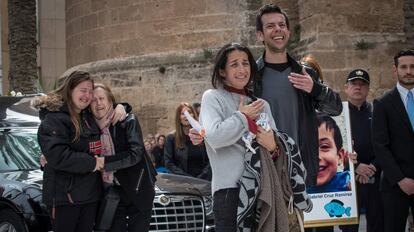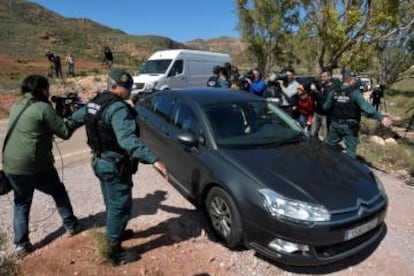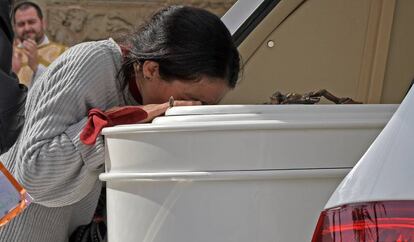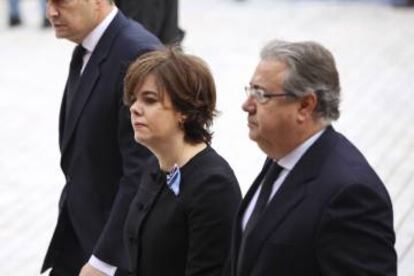Suspect in death of Spanish eight-year-old confesses but claims self-defense
Ana Julia Quezada, who was the girlfriend of the victim’s father, says she hit the boy with an axe and strangled him after he attacked her


Ana Julia Quezada, the only suspect in the murder of eight-year-old Gabriel Cruz in southern Spain, confessed to the crime on Tuesday, according to sources close to the investigation.
“She has answered all the questions that officers asked her, she is cooperating,” said her lawyer.
According to these sources, Quezada claimed that Gabriel got in her car with her so that they could go and “paint the house” on a family estate in nearby Rodalquilar, where Quezada and her partner, the boy’s father, Ángel Cruz, were renovating a property.

Once there, she claims that the youngster got angry with her and attacked her with a hatchet. She told investigators that she then hit the boy with the blunt part of the tool, leaving him unconscious. In a state of panic, she then strangled him with her hands, stripping him of his clothes and burying the body.
The hatchet had not been located by Tuesday night by Civil Guard investigators, despite excavation work in the area in search of evidence. They did, however, locate the boy’s clothing, which Quezada threw away in a trash container in the residential estate of Retamar, around 30 kilometers from the location where she allegedly killed him. She did this at some point during the 12 days that the youngster was officially missing, “when she was able to use the car alone,” sources from the investigation reported.
From the time of her arrest and up until Tuesday morning, Quezada had remained silent despite the fact that she was caught transporting the child’s body in the trunk of her car. The Civil Guard, which had her under surveillance, watched her take the corpse out of a water deposit on the family estate and arrested her as she was about to enter the garage of the property where she lived with her partner.
The details of the confession released so far leave several questions unanswered. For example, why was the property in Rodalquilar not inspected earlier? And did Quezada take the child there with the intention of killing him? Was it premeditated murder? These questions will have to be answered by a judge in Almería who is now in charge of the case. The suspect is due to be handed over by the Civil Guard to the justice system today.
Thousands at the funeral
Around 3,000 people, according to local police estimates, gathered outside Almería cathedral on Tuesday for Gabriel’s funeral. Sympathizers stood outside the temple and broke into applause when family members arrived for the Mass, yelling out: “You are not alone!”

Despite being visibly exhausted and in great emotional pain, Patricia Ramírez, the child’s mother, thanked everyone for their show of support and asked for people to honor Gabriel’s memory by listening to a song called Girasoles, by the Spanish singer Rozalén, because that is one of the last songs that she danced to with her son.
“We know that Gabriel is somewhere with his fishes, and that the bad witch in the story no longer exists,” said Ramírez, alluding to the child’s nickname, El Pescaíto, “The Little Fish.” His mother added that she is taking away “all the good things that this has brought out in people.”

Gabriel’s remains arrived at the cathedral in a motorcade a few minutes before 11am. The parents walked inside to cries of “We are all Gabriel.”
Spain’s Deputy Prime Minister, Soraya Sáenz de Santamaría, and Interior Minister Juan Ignacio Zoido attended the mass. Also on hand were the Andalusian regional premier, Susana Díaz, and Teresa Rodriguez, the head of Podemos inside the regional assembly.
The family of Mari Luz Cortés, a little girl who was murdered in Huelva in 2008, also attended the funeral.
English version by Susana Urra and Simon Hunter.
Tu suscripción se está usando en otro dispositivo
¿Quieres añadir otro usuario a tu suscripción?
Si continúas leyendo en este dispositivo, no se podrá leer en el otro.
FlechaTu suscripción se está usando en otro dispositivo y solo puedes acceder a EL PAÍS desde un dispositivo a la vez.
Si quieres compartir tu cuenta, cambia tu suscripción a la modalidad Premium, así podrás añadir otro usuario. Cada uno accederá con su propia cuenta de email, lo que os permitirá personalizar vuestra experiencia en EL PAÍS.
¿Tienes una suscripción de empresa? Accede aquí para contratar más cuentas.
En el caso de no saber quién está usando tu cuenta, te recomendamos cambiar tu contraseña aquí.
Si decides continuar compartiendo tu cuenta, este mensaje se mostrará en tu dispositivo y en el de la otra persona que está usando tu cuenta de forma indefinida, afectando a tu experiencia de lectura. Puedes consultar aquí los términos y condiciones de la suscripción digital.








































